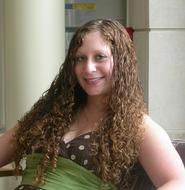
Where did the American founders get their ideas from, anyway? Kaitlyn Bishara '09 (Lewiston, N.Y.) is investigating this question in a summer research project titled "Evolution or Revolution: The Role of the Classics in the Founding of America." Bishara is working in collaboration with Edward North Professor of Classics Carl Rubino on the project, which is funded by the Emerson Foundation Grant program.
Bishara is one of 17 students who are conducting research funded by the Emerson Foundation this summer. Created in 1997, it was designed to provide students with significant opportunities to work collaboratively with faculty members, researching an area of interest. The students will make public presentations of their research throughout the academic year.
The title of her project, Bishara explains, refers not to the American Revolution itself, but to the succession of ideas that its architects drew from, and whether their concept of government was a radical departure or simply the next step in a philosophical progression. Bishara will investigate to what extent the classics served as the founders' dominant ideological base when they were planning out the new nation, and to what extent they drew from other sources like the thinkers of the Enlightenment.
To examine this question, Bishara is reading secondary texts on the subject, as well as primary classical sources, such as Plutarch and Cicero. Since the Greek and Roman historians were idealists, she explains, reading them reveals as much of their personal political philosophy as it does of classical history. She is also researching Renaissance and Enlightenment thought through the works of Machiavelli, Hume, Montague, Smith, and Hobbes, and she has chosen to focus on the American founding era by studying the writings of Alexander Hamilton, John Adams and George Wythe, each from a different region of the original colonies.
So far, Bishara has found that the classics played an indirect role in the founders' philosophy rather than directly giving them a model of government. Learning in the late eighteenth century was conducted by way of the classics, and thus provided a common "political vocabulary" to the founders, unifying them through their shared education. "It's interesting to see with the founders, how their childhood influenced their work and what they took from the classics," she notes.
However, the actual plan of the new republic owed as much to Enlightenment thought as it did to the classics: Bishara notes that in ancient Greece and Rome, the concept of the state was very different from the one imagined by the founders, since classical ideas were passed down to the early Americans only after centuries of change in the way people thought about government. The Enlightenment thinkers were important in adding their own political theories to the body of knowledge. Finally, the founders relied on their own experience during the nation's formative years when they drafted the Constitution, so that the new state was also inherently unique. The founders created "an innovative, different breed of thinking," Bishara says. "Scholars are too quick to attribute it to one school of thought."
Bishara herself says that she has always been interested in the founding era, and became interested in classics after taking several courses at Hamilton. Originally a math major, she has added classical studies as a second concentration, and after Hamilton, she plans to pursue graduate work in classics.
-- by Laura Bramley
